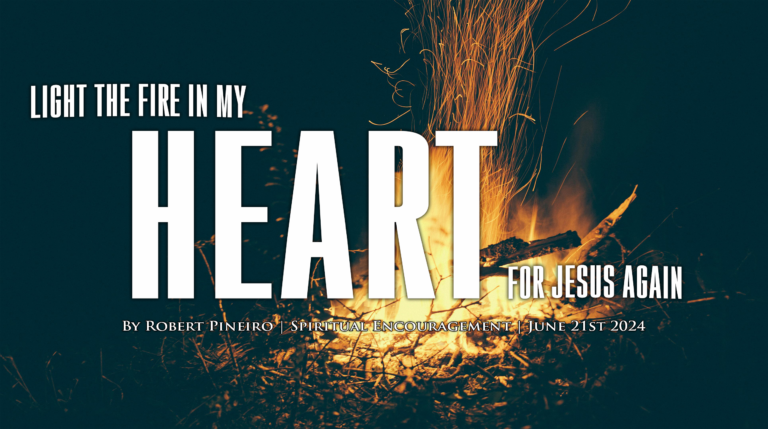When i was a youth Pastor, in a youth service, our youth worship team sang a song that goes like this: “I stand to praise you, but I fall on my knees. My spirit is willing but my flesh is so weak. Light the fire, In my soul, Fan the flame, Make me whole, Lord You know, Where I’ve been, So light the fire, in my heart again.” The song is about lighting up the fire in our hears again. So as a believer in Jesus Christ, I encourage you to stay on fire for God. I am convinced now more than ever that the world needs a church that is on fire. Not some dead, dry, barely surviving church…but a church that is on fire for Jesus!
“Then the Lord spoke to Moses, saying, “Command Aaron and his sons, saying, ‘This is the law of the burnt offering: The burnt offering shall be on the hearth upon the altar all night until morning, and the fire of the altar shall be kept burning on it. And the priest shall put on his linen garment, and his linen trousers he shall put on his body, and take up the ashes of the burnt offering which the fire has consumed on the altar, and he shall put them beside the altar. Then he shall take off his garments, put on other garments, and carry the ashes outside the camp to a clean place. And the fire on the altar shall be kept burning on it; it shall not be put out. And the priest shall burn wood on it every morning, and lay the burnt offering in order on it; and he shall burn on it the fat of the peace offerings, a fire shall always be burning on the altar; it shall never go out.” (Leviticus 6:8-13)
We can afford to lose many things in life, but our fervent passion for God is not one of them. Many of us who read the Bible don’t particularly enjoy the book of Leviticus. It’s comparable to a dentist visit—difficult to read and understand because of its detailed instructions for priests.
Growing up in the church, I often heard phrases like:
- “We need the fire!”
- “That pastor was on fire!”
- “That church was on fire!”
- “I am on fire for God.”
- “Stay on fire for God.”
- “I need a fresh fire from the Lord.”
If you tell someone unfamiliar with church that your church is on fire, they might call 911. However, the truth is that we need God’s fire in our church.
To Stay on Fire for God, We Must…
Understand What the Fire of God Is
In the physical world, fire is the result of combustion, where substances combine chemically with oxygen, producing light, heat, and smoke. It can also describe a strong feeling of excitement or enthusiasm. Spiritually, the fire of God has significant implications that many churchgoers pray for but may not fully understand.
Fire symbolizes many things in the Bible. It represents God’s holiness. For example, when Moses received the Ten Commandments on Mount Sinai, the entire mountain was ablaze (Exodus 19). Fire also symbolizes God’s judgment, as seen when fire rained down on Sodom and Gomorrah for their wickedness (Genesis 19).
When God pours out judgment, He often uses fire. The Bible describes hell as a place of eternal and unquenchable fire. Clearly, no one would pray for God’s fire of judgment upon them.
Additionally, fire represents God’s presence. In Leviticus 6:13, it says, “A fire shall always be burning on the altar; it shall never go out.” This fire symbolized God’s presence with the Israelites. When we pray for God’s fire, we are asking for His presence. We’re not seeking His judgment; we’re seeking His presence, which brings comfort, possibility, and change. When we call for the fire of God, we are asking for His presence to be with us.
In the New Testament, fire signifies God’s empowerment for service. John the Baptist said of Jesus, “I indeed baptize you with water unto repentance, but He who is coming after me is mightier than I, whose sandals I am not worthy to carry. He will baptize you with the Holy Spirit and fire” (Matthew 3:11). On Pentecost, a supernatural fire from heaven empowered those present for service (Acts 2:3-4). This empowerment led the early church to turn the world upside down.
Understand the Supernatural Fire in the Tabernacle
The fire at the wilderness tabernacle was supernaturally lit by God. Leviticus 9:23-24 describes how fire came out from the Lord and consumed the burnt offering. This fire represented God’s presence and needed to be maintained continually. The Israelites understood that as long as the fire burned, God was with them.
If we are to stay on fire for God, we must understand that the fire needs to be maintained. In ancient times, it was the priests’ responsibility to keep the fire burning by adding wood and removing ashes daily. This symbolizes our need to continually seek God and maintain our spiritual fervor.
Understand That the Fire Had to Be Maintained
Keeping the fire burning was up to the priests, who were eager for God’s presence. Likewise, many people want an encounter with God but aren’t willing to maintain His presence. We need more than just a temporary experience; we need a continuous relationship with God.
The priests had to remove old ashes and bring in new sacrifices daily. This is symbolic of Jesus’ sacrifice and the need for new mercies every morning. As Lamentations 3:22-23 says, “His mercies are new every morning.” We, too, should offer a daily sacrifice of praise (Hebrews 13:15).
The Fire Must Not Go Out
The fire burned for over eight centuries until the Babylonian conquest in 586 B.C., when Nebuchadnezzar destroyed the temple and extinguished the fire. When the fire went out, the Israelites experienced bondage, pain, and struggle. Similarly, if we let the fire of God’s presence go out in our lives or nation, we face trouble.
Understand That the Fire of God Is Still Available
Two thousand years ago, John the Baptist announced the coming of Jesus, who would baptize with the Holy Spirit and fire (Matthew 3:11). At Pentecost, the Holy Spirit descended as tongues of fire on believers (Acts 2:3-4), signifying that God’s fire is now available to all.
Maintaining the Fire
To maintain the fire of God, we need:
- Worship: Churches and people who truly worship keep the fire burning.
- Word: Reading the Word of God is like adding wood to the fire.
- Willingness to Obey: It’s not enough to read the Word; we must also obey it.
- Witness: The Spirit empowers us to be witnesses. Our faith should be like a river flowing through us to others.
- Walking with Christ: Daily living in Christ sustains the fire.
Let’s keep the fire burning! Stay passionate for God!



